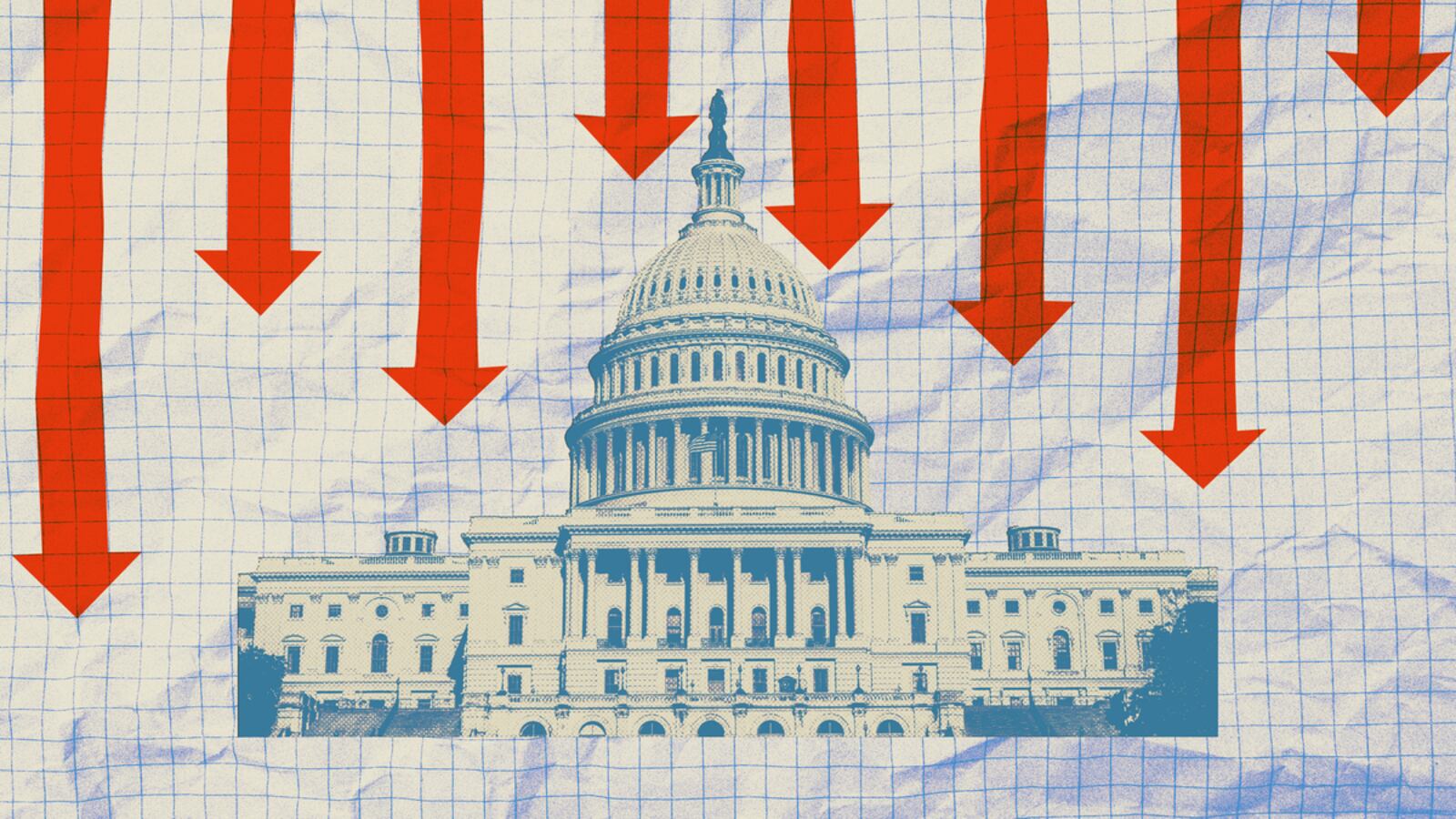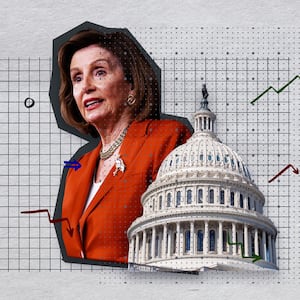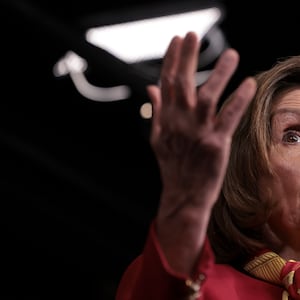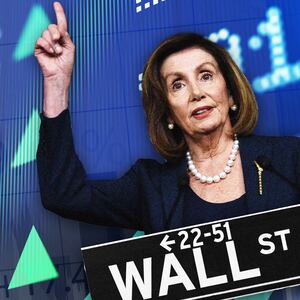Congressional Democrats had a proposal that is almost certainly backed by a majority of their members, routinely commands overwhelming public support in polls, and is being embraced as a top campaign issue by their candidates who are running in the toughest races.
What’s more, given their majorities in the House and Senate, they had the time and ability to pass it—and leaders in both chambers said they aimed to do it by the end of September.
They won’t.
On Friday, Democratic majorities in both chambers of Congress are poised to leave Washington until after the November election without passing legislation to ban lawmakers from owning or trading stocks.
Three days before they were supposed to skip town for recess, House Democrats introduced a bill that was a product of a painstaking process endorsed by Speaker Nancy Pelosi (D-CA).
Amid that dramatically abbreviated timeline—and concerns from members that the proposal either went too far or not far enough—it didn’t have much of a chance. Especially after House Majority Leader Steny Hoyer (D-MD) said he opposed it.
In the Senate, meanwhile, key lawmakers had already been on the record saying the chamber would not take up the issue before the election.
Faced with yet more gridlock and inertia, frustrations simmered among lawmakers—directed at leadership, at each other, at the process in general—as they left behind in Washington what many hoped would be a slam dunk political win and a meaningful policy achievement.
“I don’t know why,” said Rep. Angie Craig (D-MN), “we’ve made something not so complex so complex.”
Lawmakers, aides, and advocates close to the push stress that all is not lost. The optimistic outlook, as some of them tell it, is that Congress could return for the so-called “lame-duck” session between mid-November and January, focus on resolving differing views over what a stock trading ban should look like—and dare members to vote against a compromise bill.
“There is optimism that the advocates for the issue get on the same page and there’s a real debate on a strong package,” said a senior House aide. “It’s toxic to vote against this, which I think means a bill will pass.”
But this process, tortured even by the high standards of congressional Democrats, has left some lawmakers with the distinct impression that the problem isn’t that too many members oppose this version of a stock trading ban. It’s that too many oppose the idea of doing anything on this issue, period.
“There’s some who just are genuinely opposed to it,” said Rep. Dan Kildee (D-MI), a vocal proponent of a stock trading ban. “We did have some hope that some objections were characterized as technical… and then we can work some of that out. But it may be that it’s really more of a fundamental objection.”
Kildee, who serves as a senior whip—also known as a vote-counter—for the Democratic leadership, said he believes “a very strong majority of our caucus is for it.”
“I think it’s a mistake not to do it,” he said.
Many lawmakers agree, and for a number of reasons.
There is, first and foremost, the politics of the issue. Public opinion polls routinely show that voters enthusiastically support the idea of banning members of Congress from trading stocks. A poll released Thursday by polling shop Data For Progress, for instance, found that 77 percent of Americans back the idea, including 75 percent of Republicans.
Unsurprisingly, lawmakers running in competitive races—mostly Democrats—have made stock trading bans a central issue in their 2022 campaigns. Craig, a leading proponent of the legislative push, is one of the most vulnerable House Democratic incumbents on the ballot this fall, for instance.
Meanwhile, lawmakers from Arizona to Colorado to New Hampshire have cut TV ads proclaiming their tough stands on the issue; Democratic operatives would have loved to cut more ads advertising a victory on the issue before November.
Beyond that, many lawmakers simply believe a stock trading ban is good policy. In recent years, investigations by news media have uncovered the remarkable extent to which lawmakers’ power has conflicted with their investment portfolios.
Those stories have further undermined public trust in an institution that had little to begin with. Many on Capitol Hill, eager to find ways to restore even some of that trust, worry that failure to pass something addressing the issue could have far-reaching consequences.
“The grassroots on both sides are clamoring for this particular bill,” said Rep. Raja Krishnamoorthi (D-IL), a member of the working group that produced the legislation.
“There are certain people and certain interests that don't want to see this happen, and it's unfortunately more a function of this having been the practice for hundreds of years at this point,” Krishnamoorthi added. “So now, I think everyone sees the writing on the wall. It has to happen.”
For over a year, a group of Democratic and Republican lawmakers have been trying to pass legislation banning lawmakers from owning or trading stocks. In January 2021, Reps. Abigail Spanberger (D-VA) and Chip Roy (R-TX) introduced the first bill, but many other bills followed, written and backed by Democrats and Republicans in both chambers.
Top Democratic leaders had always been chilly about the idea. Pelosi herself had publicly defended lawmakers’ ability to participate in the market.
Despite the frequent news stories about the prolific stock trading activity of the speaker’s investor husband, Paul, congressional insiders typically believed that Pelosi’s moves reflected a reluctance on the part of senior members of her caucus—her closest allies—to entertain any sweeping changes to ethics standards.
But in February, with Pelosi under considerable pressure from a diverse array of her members to take up some bill, Capitol reporters hyped that the speaker would be making an announcement on the issue, one anticipated as the moment that she might finally lend her blessing to the stock ban push.
Pelosi didn’t. Instead, the speaker merely said her caucus was trying to build “consensus” and that the House Administration Committee would review the various proposals.
In retrospect, that moment may have marked the beginning of the end. In the months that followed, the Administration panel—steered by Rep. Zoe Lofgren (D-CA), a close Pelosi ally—ran a slow and somewhat opaque process that alienated some of the key advocates on the issue.
Over the spring and summer, there were incremental developments in the process that seemed to gesture at progress, but some members grew convinced they were simply being slow-walked by a leadership that was never really interested in passing the legislation anyway.
Still, through it all, Democratic leaders insisted they planned to arrive at consensus language for the bill in August. Pelosi said she believed it could get a vote in September. The legislative text, blessed by the speaker, was finally released in the last week of September, with three days left in the pre-midterm legislative calendar.
The proposal, titled the "Combating Financial Conflicts of Interest in Government Act,” would ban high-ranking officials in all three branches of the federal government—and their spouses and dependent children—from owning and trading stocks, as well as cryptocurrencies. The legislation would also require them to place their investment holdings in qualified blind trusts, which give them no control or visibility into their investments while in office.
If that bill had come to the floor for a vote, plenty of Democrats would have been happy to vote for it. But many of the earliest advocates of a ban, like Spanberger and Roy, felt the scope of the bill—which included Supreme Court justices—was so broad that it interfered with the original, more achievable goal of policing Congress. Progressive lawmakers, meanwhile, felt that many of the provisions were not strong enough to truly ensure stronger accountability.
“House leadership decided that they wanted to kind of reinvent the wheel and do a bill that includes a variety of other things,” Spanberger told reporters on Thursday.
“What I’m focused on,” she said, “is really getting back to the basics, which is like this is an issue that lots of people agree on.”
Roy, a conservative Texas Republican, said publicly what plenty of Democrats privately feel at this point. “There’s a lot of efforts to purposely make this just kind of die under its own weight,” he told The Daily Beast. “And that’s not surprising.”
To introduce a complex bill the week that lawmakers were aiming to prevent a government shutdown—and then race to the campaign trail—all but fundamentally ensured it would be put on ice.
Hoyer, the second-ranking House Democrat, confirmed that in remarks this week. “I haven’t read it,” he said. “It’s a complicated issue, as you can imagine, as a new rule for members they have to follow, and their families as I understand, so I think it deserves careful study to make sure if we do something, we do it right.”
At this point, Democrats will likely have little time to do it right. If they lose control of the House or Senate, their remaining time in the majority before January will be a precious commodity, particularly in the Senate, which confirms judges and administration posts.
While many Republicans have signed on to stock trade bans, Democrats are doubtful that either chamber’s likely leaders—Sen. Mitch McConnell (R-KY) or Rep. Kevin McCarthy (R-CA)—would actually take up the issue if they control the gavels next year.
Still, in the Senate, where a bipartisan group of members has been active on the issue, Majority Leader Chuck Schumer (D-NY) has long vowed to hold a vote on a stock trading proposal this year. And Pelosi could face real pressure to put something on the floor by January.
“I’m going to continue to negotiate in good faith and to work on this field in good faith,” said Craig, the Minnesota Democrat. “And I'm gonna assume that my colleagues in leadership want to do the same.”












